The abuses between animal lovers and the rest are flying thick and fast on building WhatsApp groups. The police is grappling with dog attack complaints that have split families down the centre. How did human-pet conflict in urban India reach tipping point?
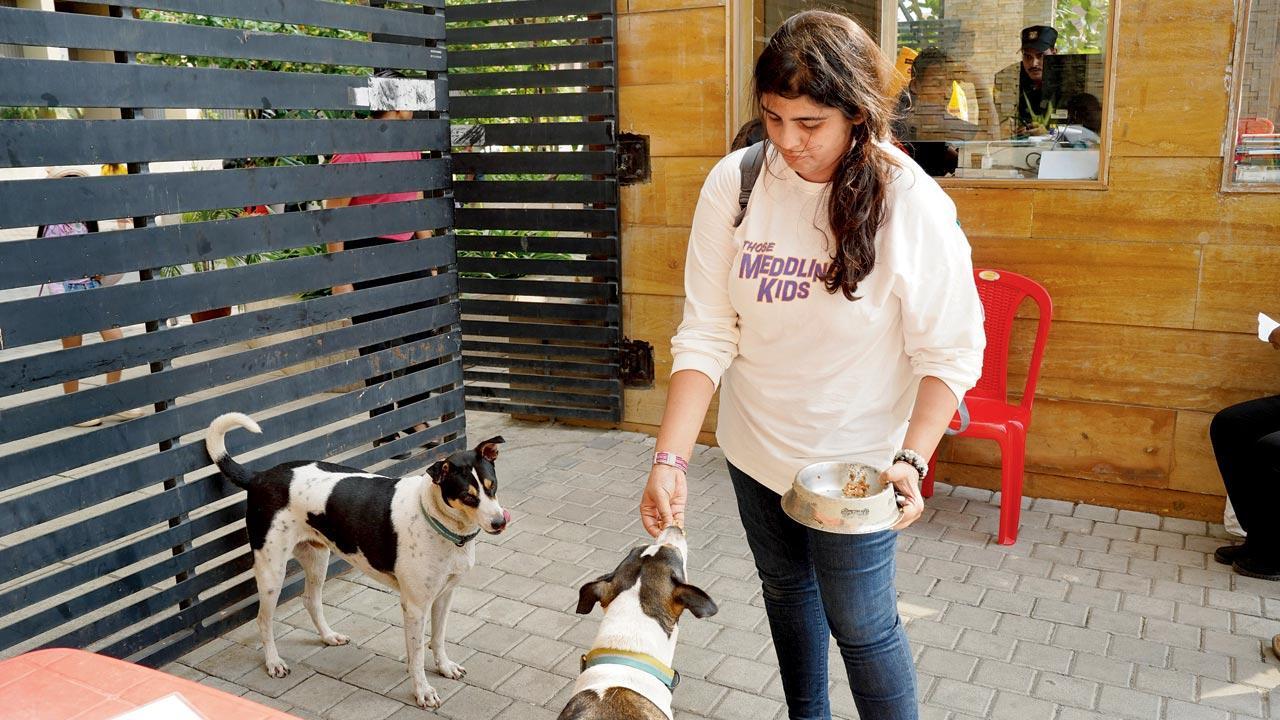
Shivani Sharma’s family had to move apartments after their landlord gave in to pressure from the society’s managing committee and did not renew their lease. Sharma followed all the rules of feeding community animals, and had kennels constructed outside the premises for them, which the committee found “unaesthetic”. Pic/Aishwarya Deodhar
The human-pet conflict in Indian cities is reaching a boil, and there are as many sides and layers as a prime time joint family drama—only it’s very much real, and brutal, with real blood being spilled. The secondary is between responsible pet parents—the ones who pick up poop, walk their dog on leash, take responsibility to safeguard others from their aggressive dog; and those who don’t. Building residents WhatsApp groups are buzzing with ugly verbal altercations. In extreme cases, fights have broken out, police complaints with additional assault charges, registered.
ADVERTISEMENT
The latest revelation in a drug-trafficking case concerning actor and model Chrissann Pereira, was that there seems to be a seed of vengeance in framing her, and it involves animals. As reported by mid-day in its April 25 edition, Borivli resident and prime accused Anthony Paul allegedly told the police that his sister and Pereira’s mother, Pramila, had an altercation during the pandemic over a pet-related issue in their housing society. The crime branch said that he used the other accused, Rajesh Bubhate, to frame Pereira, sending her to Dubai with an award trophy stuffed with drugs. Pereira, who was lodged in Sharjah Central Jail since April 1 was released on April 26.
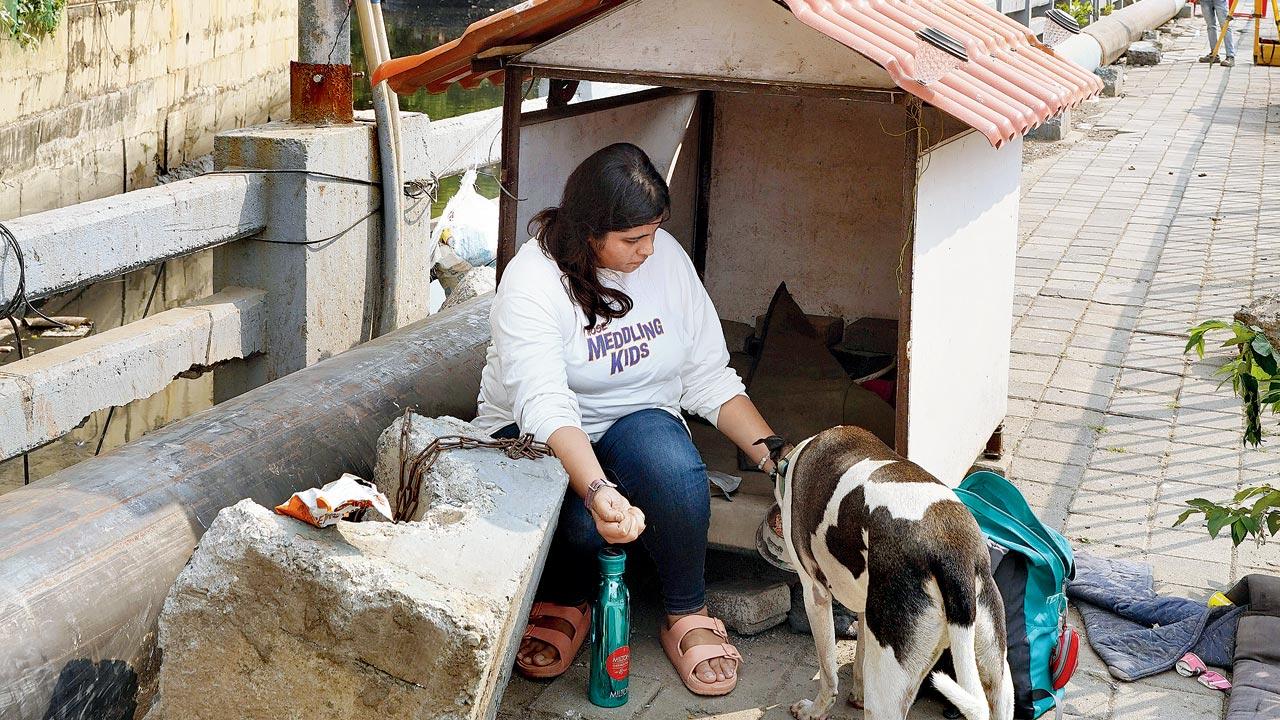
There are other varieties of casualties too: Faeces spreading disease, delivery executives bitten on the groin, pregnant women tripping in panic, dogs losing their freedom to walk within a society compound, and …in many cases, euthanised for not being guided on the polite behaviour expected from them in human society.
Tommy is weaponised to abuse a spouse or causing estrangement and isolation from family and societies, divorces, eviction from homes and disinheritance.
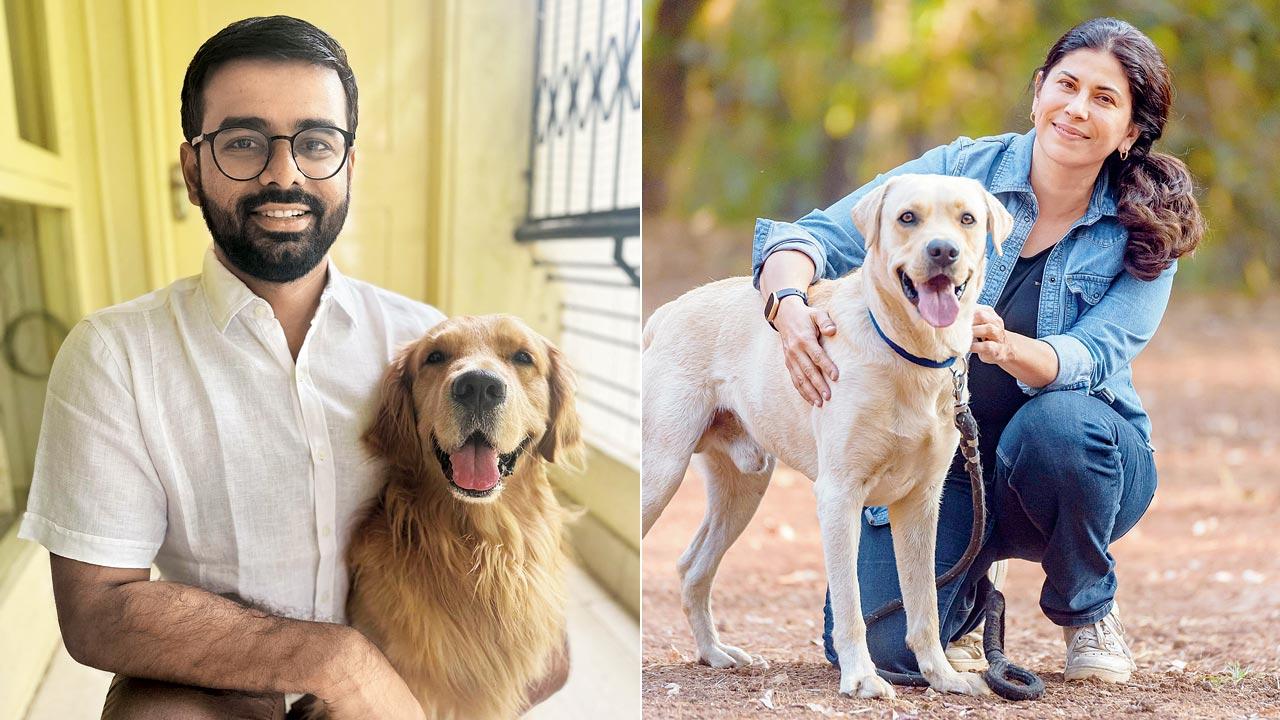 S Vivek, lawyer and Shirin Dhabhar, Canine behaviourist
S Vivek, lawyer and Shirin Dhabhar, Canine behaviourist
The average animal rescuer is a unique breed—highly empathetic, sensitive, but also belligerent and suffering from compassion fatigue. “We see so much trauma,” says Shivani Sharma, a canine behaviourist and former animal welfare officer, “that sometimes, we lose sight of what we were doing.” Sharma was a regular at adoptathons and has witnessed some heartbreaking scenes.
And this one, she lists as one of the milder cases. There was a lady who scooped up a litter of six from the streets after their mother died. Unable to care for them, she tethered the pups in different corners of the house and cleaned up ‘susu-potty’. With no walks or training, the pups barked all day and the house reeked of animal waste. “The society residents started bullying her,” says Sharma. “They would light incense outside her door, cover their nose when she walked past and mutter that she was mad...all within hearing distance.” The relationship between the lady and her husband was strained, and this was her way of rebelling against him. “Saving those puppies made her feel heroic and wanted… gave her a sense of self-worth,” says Sharma, who is also a clinical psychologist by education. In another case Sharma counselled, a young woman in her 20s—who was the sole earning member in the family—used her income to feed dogs at the cost of domestic responsibilities. “Her mother had a prolonged illness,” says Sharma, “and her father had retired. They threatened to throw her out, but she knew they wouldn’t since they needed her income. You could sense she resented having to care for her mother. The animals gave her a sense of belonging and validation.”
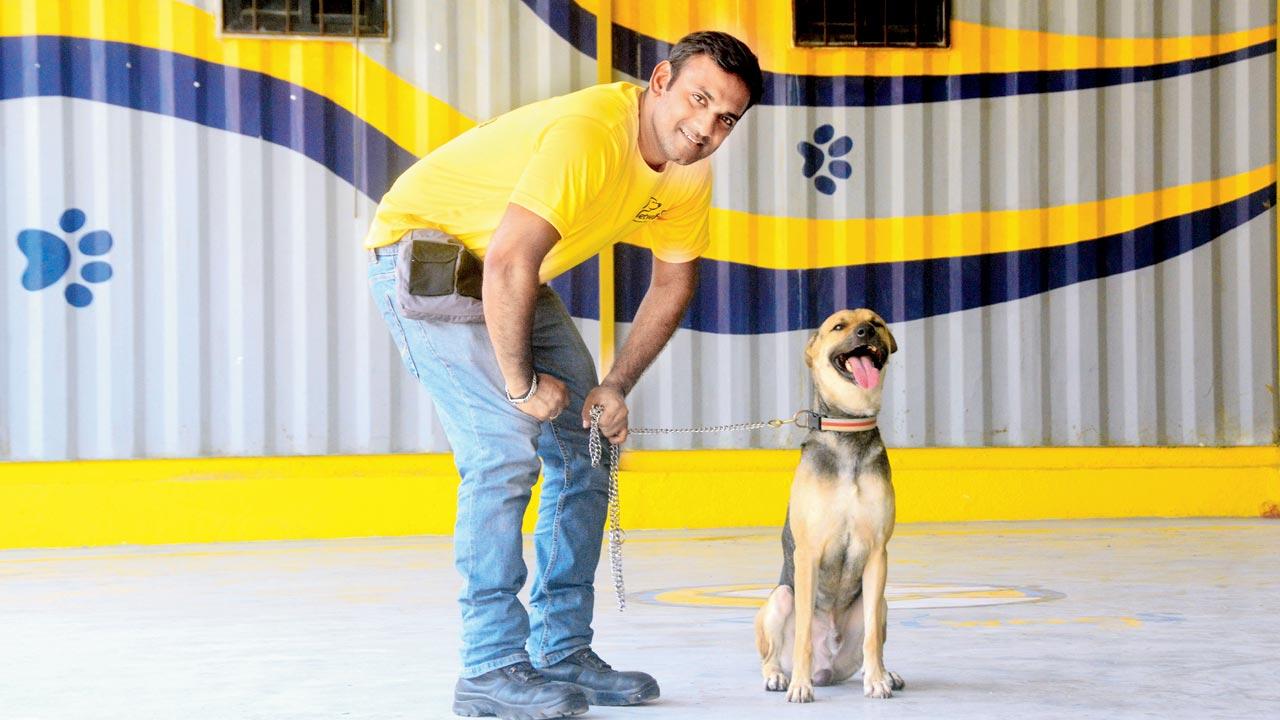 Facilities such as Srinivas Jakkani’s in Thane are sometimes the last resort for dogs who don’t like humans. Being housed here comes at a price, considering the training involved, and the risk to the humans handling them. Pic/Nimesh Dave
Facilities such as Srinivas Jakkani’s in Thane are sometimes the last resort for dogs who don’t like humans. Being housed here comes at a price, considering the training involved, and the risk to the humans handling them. Pic/Nimesh Dave
It’s not the only time a pet dog is central to family politics. Om Vaikul, a canine behaviourist who deals with aggressive dogs, found himself making no headway in one case because the man of the house refused to attend his training sessions. The dog habitually attacked and bit his wife, all over the body. For a training programme to work, it’s imperative that all family members be on the same page. “I found out that the couple had had a very bad marriage for many years, and were on the brink of divorce,” says Vaikul. “The man enjoyed the dog attacking his wife and wasn’t about to do anything to stop it.”
In another case he handled, the dog—a tiny little Yorkshire puppy—was ripping flesh of the maid’s legs, from ankle to knee. “The sad truth is that no one cares when the household help or staff suffers,” says Vaikul. “The problem comes when someone important is bitten—in this case, it could be the grandmother who was the owner of the building in which the whole family lived. There was risk of the pet-parents being cut off from the family business and inheritance!”
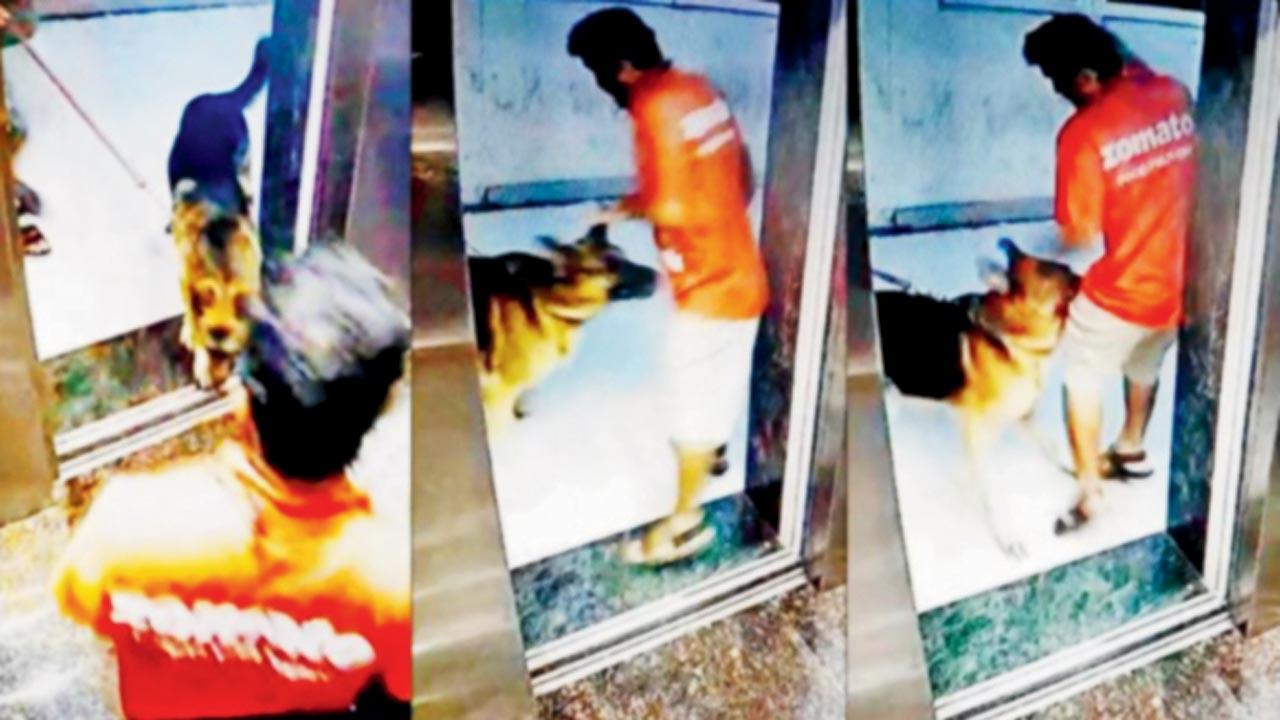 A GSD lunged at delivery agent Narendra Periyar last year at a housing society in New Panvel, leaving him bleeding
A GSD lunged at delivery agent Narendra Periyar last year at a housing society in New Panvel, leaving him bleeding
Unfortunately, this apathy extends to delivery executives too, as Narendra Pariyar found out last year. Pariyar worked as a delivery agent for food aggregator Zomato and was wounded on the groin by a German Shepherd dog (GSD) as he exited the elevator at a housing society in Panvel in 2022. He bled and was rushed to the hospital. The German Shepherd’s parent, Avinash Singh, took full responsibility for the accident and corrective measures: He covered Pariyar’s medical bills which amounted to Rs 40,000, and on the advice of a trainer, had the dog neutered, trained and now never walks him without a muzzle. He also walks him before 7 am and after 8.30 pm, when there are fewer dogs and people around.
“I was out of town,” he narrates to mid-day, “and my 10-year-old son was walking the dog. The GSD is a guarding breed and was alarmed at the sudden appearance of the delivery guy. And when he ran, the dog’s natural instinct was to chase him.” All Pariyar would tells this writer when we called him, was, “I want to put the whole thing behind me. There is nothing left to say.”
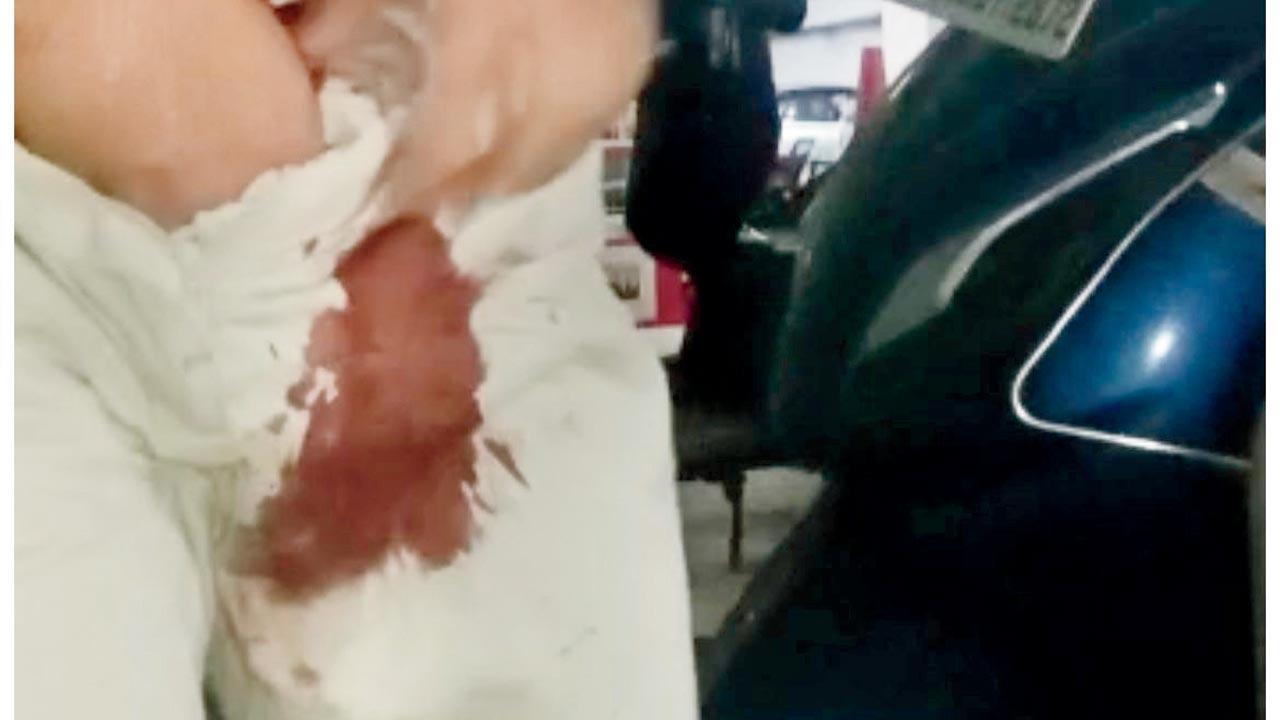
After the incident, the Panvel housing society’s managing committee, headed then by KK Nambiar, came up with a charter of rules for pet parents. Some of these might be inconvenient—the dogs have to be walked out on the service road—but most others are crucial and could become the norm across the city if pet parents do not take responsibility for their wards: Owners of large breeds such as Rottweiler, GSD, Dobermann, Pitbull… which are territorial and protective must be accompanied by an adult owner or walker who can handle them effectively. They should be muzzled at all times when outside their home. The rules state that pet owners are advised to be extra careful when exiting and entering the lift, and if there is an individual in there who would prefer to not be with a dog, they are requested to wait. The penalties have been decided at Rs 1,000 for the first offence, Rs 2,500 for the second and Rs 5,000 thereafter. Pet parents have been assured they will not be discriminated against, if they follow these rules.
So far, this plan seems to have worked: There have been no accidents in the last eight months.
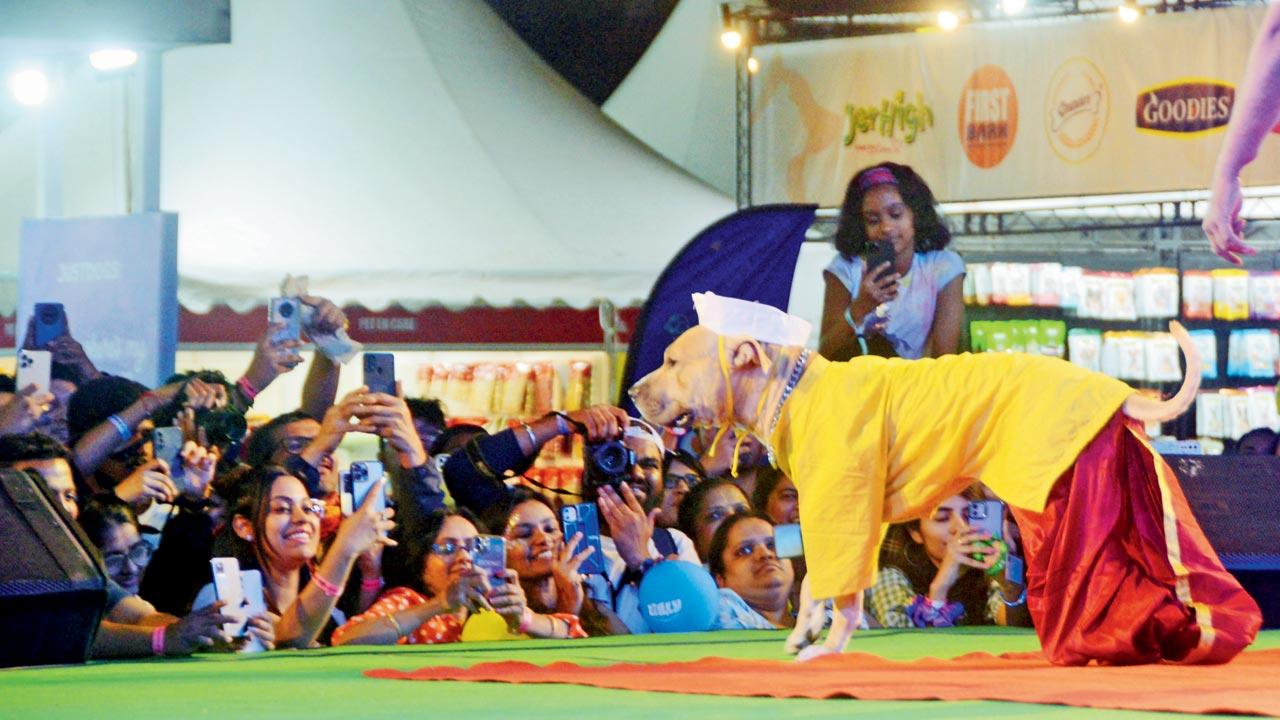 Pet fairs and festivals, with loud speakers, costumes, crowds, innumerable dogs of various sizes—and sometimes prey and predator species together—are highly stressful for sensitive dogs who don’t like other dogs or people. It often makes aggression and anxiety worse. Pic/Satej Shinde
Pet fairs and festivals, with loud speakers, costumes, crowds, innumerable dogs of various sizes—and sometimes prey and predator species together—are highly stressful for sensitive dogs who don’t like other dogs or people. It often makes aggression and anxiety worse. Pic/Satej Shinde
It is possible to love animals and be responsible for them,” says leading canine behaviourist Shirin Dhabhar, recipient of the President’s award. “When we don’t pick up poop or refuse to walk our dog on a leash, or muzzle him, knowing fully well that s/he’s reactive, we give society more fodder to tighten the rules. Dogs aren’t allowed in public gardens now, and in the private gardens of most housing societies too. Without required exercise, they have more pent up energy to expel. In the end, it’s the dog who suffers.” Already there are housing complexes in Mumbai that do not allow dogs at all—whether you live there or are just visiting.
Dhabhar traces wrong breed choices, misinformation and anthropomorphisation—the assigning of human qualities to animals—as the root of the problem.
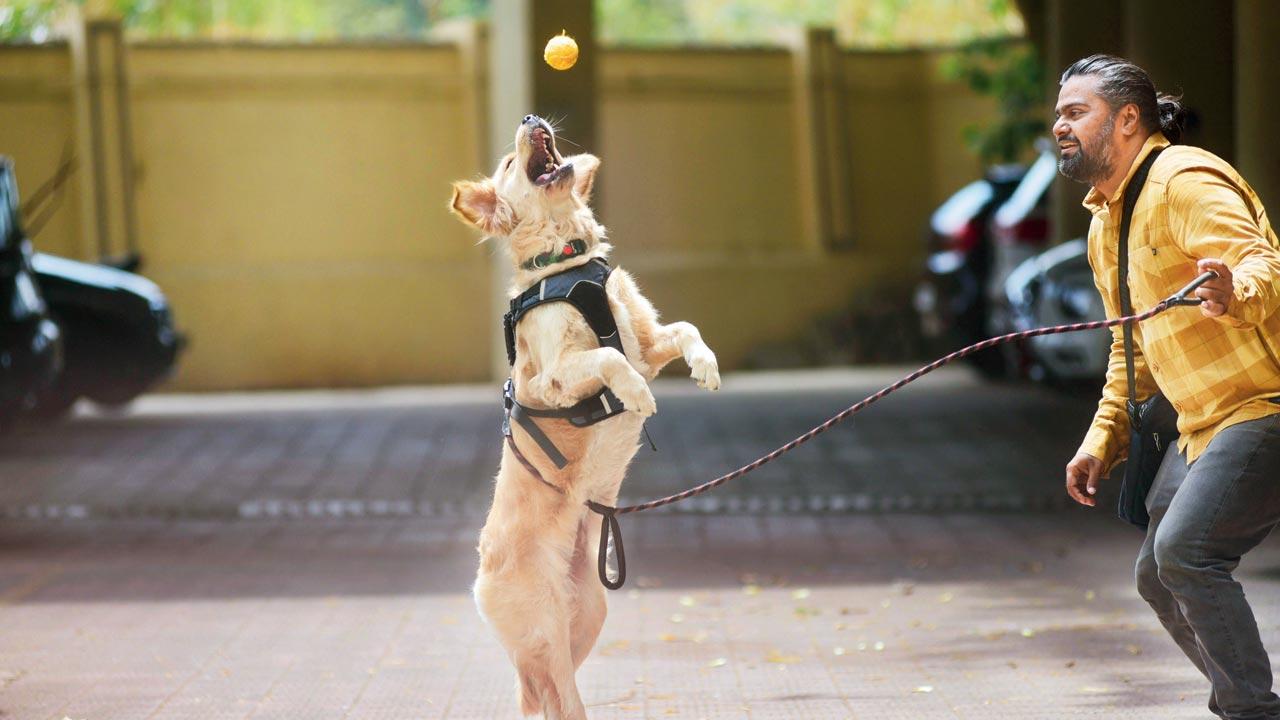 Om Vaikul consults on aggression cases and has found that some pet parents enjoy the dog biting a member of the family they have an axe to grind with. Pic/Pradeep Dhivar
Om Vaikul consults on aggression cases and has found that some pet parents enjoy the dog biting a member of the family they have an axe to grind with. Pic/Pradeep Dhivar
It’s not hard to see why. Some couple in urban centres are choosing to have pets instead of children. In the pandemic, pet sales and adoptions rose as people felt they would be able to give the animal the time it needed. Cute videos on social media keep pushing pairings of Pitbull types with babies, or huskies yodelling.
Though well-intentioned, puppies of street dogs are plucked from their natural homes on the street and pushed into the homes of first-time parents through ‘social-media driven adoptions’. These new owners, who thought they were getting a dog they could cuddle with, realise, too late, that street dogs and cats view physical affection as a threat.
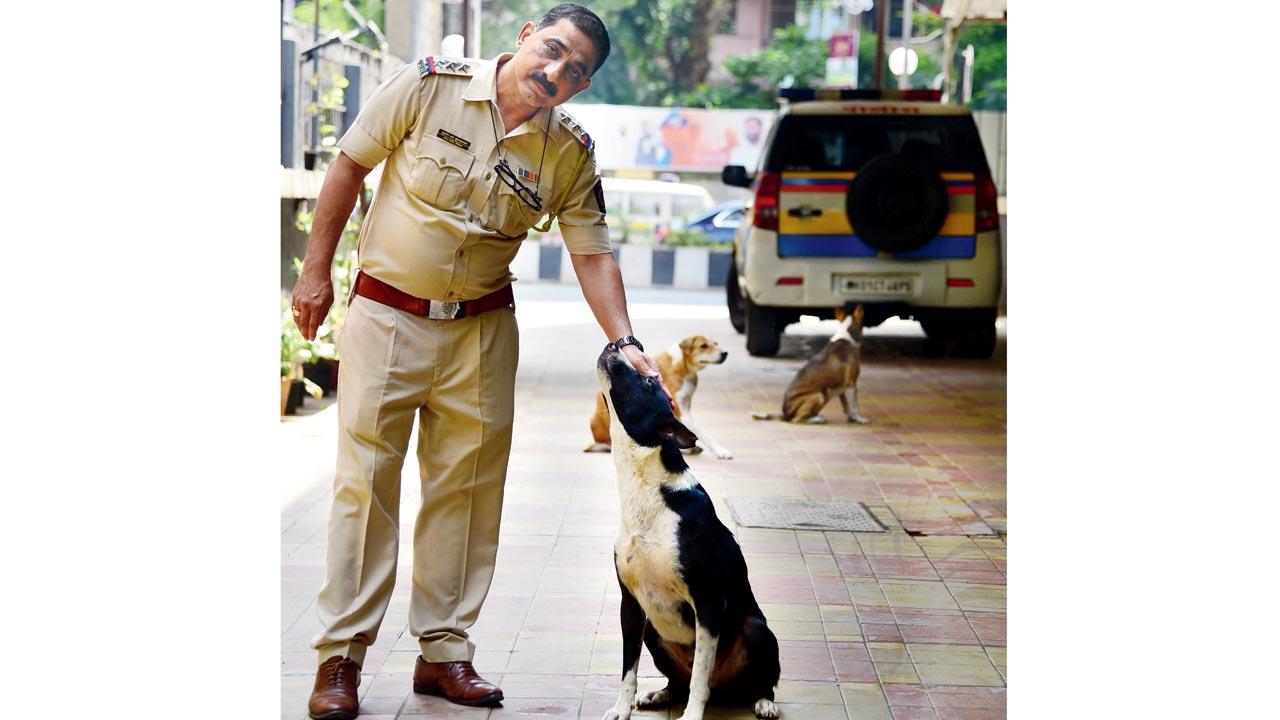 Pic/Nimesh Dave
Pic/Nimesh Dave
The Indian pet care industry, valued at Rs 7,400 crore in 2021, is estimated to grow at 19.2 per cent between 2022 to 2032. It feeds this feeling for our ‘furbabies’, selling us frocks to drape them in and encouraging large scale festivals, marathons and fashion shows for them to ‘mingle’. It is in fact, an extremely chaotic and unnatural situation for dogs and cats, which only worsens reactivity.
No dog is a bad dog, but s/he can be the wrong dog for the job. The guarding instinct for breeds such as streeties, GSDs, Dobermann raises its head only at puberty—at about 11 months of age. Sometimes, the choice of breed is made, impulsively, by the child of the house. If not trained using kind methods before puberty, the animal can choose to snap, snarl, lunge, bite at anyone who approaches him/her while sleeping, eating, playing with toys, touching parts of the body or if it’s just surprised by sudden appearance. Even with training, some instincts may not be subdued.
 In November 2022, a German Shepherd dog handled by a child lunged at Zomato delivery executive, causing him to bleed from his genitals. The then managing committee of Indiabulls Greens Marigold CHS in Panvel, under chairman KK Nambiar, charted rules for pet owners that have avoided such accidents since then. Pic/Anurag Ahire
In November 2022, a German Shepherd dog handled by a child lunged at Zomato delivery executive, causing him to bleed from his genitals. The then managing committee of Indiabulls Greens Marigold CHS in Panvel, under chairman KK Nambiar, charted rules for pet owners that have avoided such accidents since then. Pic/Anurag Ahire
Doting pet parents may forgive small shows of aggression and resist disciplining it in the name of love. They might even think that leashing him or her curtails their freedom. A running child would trigger a dog’s chase instinct. Flash forward 40 years: There’s one more adult on a housing society’s managing committee who was traumatised by a dog as a child and now does not want them to walk in common areas. Bruno pays the price, again.
Often, an aggressive dog is shifted from home to home, without the new owners being told about the problem. Often, the parents are guilted into keeping the dog—even at risk to their well-being—under the persuasion that love cures all. Unfortunately, it takes time, participation, behavioural science, a trained professional and sometimes a board-and-train facility like the one run by Srinivas Jakkani to control and manage the situation. It comes as a price, as all professional services do—especially when there is a threat to the life of humans—but are rarely engaged since they do not draw compliments like a bandana or bow-tie on the dog’s head will.
Jakkani knows of a case where a bride coming in from the village was not told about an aggressive Labrador at home. “He was in a crate first,” says Jakkani, “and then slowly, they started letting him out and he bit the lady several times over a year. Finally, she went back to the village and since both families were from the same village, the panchayat intervened.” In another case, a woman’s licentious raising of her dog led to him grabbing her husband’s genitals while they were copulating. “The dog thought she was being attacked,” says Jakkani. “She considered keeping the dog out of bedroom cruelty.”
“That’s just mean,” says Dhabhar of people being put at risk in such situations. “Love cannot take the place of common sense.”
“One of the problems,” says lawyer S Vivek, “is that there are no laws to incentivise responsible pet parenting, and de-incentivise irresponsible love. He suggests that a well-behaved dog could be welcomed on public transport, into certain restaurants, malls and other public areas. The parent of a dog who causes harm, should be penalised.” As per Indian law, pets are ‘owned’ which means that under the Indian Penal Code, the ‘owner’ or pet parent can face criminal charges of negligence if the dog causes harm to another dog, individual or property. This could include unintentional harm; say, a dog jumping to say hello to a person who then loses balance; or intentional harm, when a known reactive dog is allowed to walk without a leash. With an overburdened justice system, police are resistant to filing an FIR in animal conflict cases, and rarely does one hear of such instances reaching the court for sentencing—which could include imprisonment under IPC Sections 289. “As the owner of a dangerous animal,” says Vivek, who himself is a pet parent, “attempted murder could also be a common charge. If malafide intention is found—the presence of ill will—it could escalate the punishment.”
However, feeding an animal—whichever the species—is a fundamental right under the Constitution of India. And not even the police can stop you, says Senior Inspector Sudhir Kudalkar of MHB Police Station in Borivli. With four Persian cats at home, the cop is an animal lover. He became a feeder during the pandemic when he realised that with restaurants closed, stray cats and dogs had no food source. He arranged for permission for feeders to be classified as Essential Services to carry out their work during the lockdowns.
Now, he has assigned four feeders near his residence in Vile Parle East to feed 160-170 cats; 10 to 12 dogs and four to five cats at his police station in Borivli also get regular meals. The footpath outside his home has concrete water bowls filled with water and food. He also initiated a group called PALS that facilitates adoptions, mediates friction between stray animals feeders and housing societies, and guides complainants of cruelty to animals.
“Most policemen do not know 90 per cent of the laws pertaining to animals,” SI Kudalkar confesses, “They should, but in our one year of training, we are familiarised with the most common cases—theft, dacoity, physical harm, etc.” So he takes it upon himself to educate the officer concerned in such cases.
“But cleaning up after your pet, even after feeding them, is your responsibility,” he says. “Pay the sweeper a little extra, because this is beyond his/her job role if you want them to do it. And always feed only in an assigned area.” However, one cannot stop pet owners from walking their dogs within the society compound.
But even after following all these rules, some feeders face serious harassment. Sharma fed the strays in an assigned area in the posh Lokhandwala society she lived in, and even raised funds to build shelters for the community stray outside the gates; but then the managing committee decided they were not “aesthetic enough”. “That cost R18,000,” she says. “They began harassing my landlord, who was an animal lover. When the lease expired, he apologised but refused to renew it. He was told that tenants would come and go, but he had to live with the other apartment owners. This was a fancy building with industrialists and producers taking up two to three floors. They were just anti-pets and would have new rules every day.”
With the rise of high-rises with Italian marbled lobbies and manicured lawns, ‘hygiene’ (code for aesthetics) is another reason the apathy to animals grows. Children, humans and dogs are not allowed on manicured lawns (even if poop is picked up) and separate elevators are assigned to pets and staff.
And so, the battle continues: Animal detesters are going to have to swallow that they will have to share the world with increasingly more cats and dogs, and capitalism is going to push for them to be in public spaces. Animal lovers are going to have to educate themselves, raise the dog or cat right and steer with rationality to ensure that their furbabies have the best of all worlds.
30
Increase in percentage of Indians from last year who said in a LocalCircles survey that attacks by strays/pets in their area/city/district was an issue
79
Percentage of Indians surveyed who blamed the municipal authority or local body for both ineffective management of strays and registration of pets
Rs 1,000 - Rs 5,000
Penalties decided by a Panvel housing society if pet owners don’t follow the rules decided in a charter following an accident where a resident German Shepherd lunged at a delivery executive, wounding his groin
The ultimate animal conflict FAQ
Is it legal for me to feed animals in my area, building?
It is the fundamental right of a citizen (under 51 A90g) to feed animals out of their own resources. However, they can be fined for littering if they create a mess and don’t clean up afterwards.
Can my housing society ban me from walking my dog in the common areas?
No, a housing society cannot ban a pet belonging to a resident from using common facilities like lifts and parks or impose a fine or special charge for the same.
But, a registered co-operative housing society can make bye laws for self-governance and can include rules about the access and movement of animals. However, for a complete ban—say, on walking dogs in common areas, there has to be: 1) In alignment with the society’s bye-laws, and not just an ad-hoc rule, which would require an amendment of the bye-laws. 2) Enough ‘reasonable cause’ considering interests of all residents, not just one group. It can’t be on account of a stray incident.
Am I legally liable for the intentional and unintentional harm caused by my pet?
As “owner” of the animal, you can face a criminal charge of negligence and malafide intent if your dog, intentionally or unintentionally, harms another human or a dog. If it is found that you knew the dog to have reactive tendencies (i.e. this is a repeat offence), it comes under intentional harm.
Does my dog need a municipal liscence?
Yes; it is legal proof of ownership and can be obtained from your ward office. It has to be renewed every year.
Can my landlord stop me from keeping a pet dog in my apartment?
Yes. Having pets at home is a fundamental freedom guaranteed to the citizens of India as per the Constitution. However, an apartment owner can choose to not allow his/her tenants to have pets by stipulating it in the tenancy agreement beforehand.
Whose responsibility are stray animals if they cause a nuisance?
Stray dogs and cats (or those who are not the licenced pets of residents) are considered the responsibility of the local civic body, and their welfare is governed by the Central Act For Prevention of Cruelty to Animals. As property of the municipal corporation, they have the right to live within their territory and it’s illegal to displace them. Their immunisation and sterilisation, or their removal in case of danger (aggression or rabies) is the responsibility of the local civic body, whose representatives should be approached by the residents in case of nuisance.
What’s the best way to feed a stray?
Away from common areas, entrances to home and buildings, away from staircases and common access points, say at the back of buildings, and in multiple locations so that dogs don’t crowd and fight.
30 per cent more people feel stray/pet dog attacks are common in their area
A recent survey conducted by LocalCircles received over 53,000 responses from citizens located in 326 districts of India; 67 per cent respondents were men and 33 per cent were women; 44 per cent respondents were from tier 1 cities, 34 per cent from tier 2 and 22 per cent respondents were from tier 3 & 4 districts. It asked citizens: are attacks by stray and/or pet dogs on citizens an issue in your area/district/city? A majority or 82 per cent of the 13,590 people surveyed stated that attacks by stray or pet dogs or both are common in their area/district/city. The survey administrators said that they had seen a 30 per cent increase over the last year in citizens who believe that attacks by stray and/or pet dogs are common in their area. Only 33 per cent of those surveyed felt that most of the dog owners in their area restrain and train their pets effectively. A massive 79 per cent believed that the municipal authority or local body in their area was ineffective in managing both stray dogs and registration of pet dogs. A majority also wanted the government to pitch in; 71 per cent citizens wanted stray animal management to be made a measurement criterion for Swachh Bharat rankings and expect the government to provide funding to local bodies to tackle the challenge. LocalCircles is a community social media platform that enables anyone to raise issues for policy and enforcement interventions.
Centre’s new direction on animal birth control and feeding strays
Earlier this month, the Centre reached out to the local self-governments (LSGs) and Resident Welfare Associations (RWAs) to implement a revised set of Animal Birth Control Rules prepared by the Ministry of Animal Husbandry; the rules place the responsibility of maintaining and controlling the stray dog population on LSGs and RWAs.
1. Sterilisation and immunisation of stray dogs is the responsibility of local bodies/municipalities/Municipal Corporations and Panchayats.
2. Resident Welfare Associations and Apartment Owners Association must dedicate—mutually agreed upon—feeding points in localities and apartment complexes.
3. The feeding areas must be far from children play areas, entry and exit points of the buildings, staircases. It can be done in an area that is least likely to be frequented by children and senior citizens.
4. The feeding times also need to be assigned taking into account the movement of residents.
5. Designated feeders should assure that there is no littering/pooping.
6. Feeders must take responsibility for catching and releasing strays for immunisation and sterilisation.
 Subscribe today by clicking the link and stay updated with the latest news!" Click here!
Subscribe today by clicking the link and stay updated with the latest news!" Click here!







